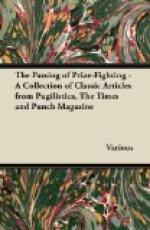English people abroad do not, as a rule, drop aphorisms by the way; but our Italian loves to do so. Thus, to one stranger (in the section devoted to Virtues and Vices), he remarks, “Uith-aut Riligion ui sciud bi uorS then bists.” To another, “Thi igotist spichs continniuallE ov himself end mechs himself thi sentaR ov evverE thingh.” And to a third, a little tactlessly perhaps, “Impolait-nes is disgostin.” He is sententious even to his hatter: “E het sciud bi proporscionD tu thi hed end person, for it is laf-ebl tu si e laRgg het op-on e smol hed, end e smol het op-on e laRgg hed.” But sometimes he goes all astray. He is, for instance, desperately ill-informed as to English law. In England, he tells us, and believes the pathetic fallacy, “thi trens start end arraiv verE pongh-ciuAllE, othaR-uais passen-giaRs hu arraiv-let for theaR bis-nes cud siu thi CompAnE for dem-egg-S.”
He is calm and collected in an emergency. Thus, to a lady who has burst into flames, “Bi not efred, Madam,” he says, “thi faiR hes cot jur gaun. Le daun op-on thi floR, end ju uil put aut thi faiR uith jur hendS.” His presence of mind saves him from using his own hands for the purpose. Resourcefulness is indeed as natural to him as to Sir CHRISTOPHER WREN in the famous poem. “Uilliam,” he says to his man, “if enEbodE asch-s for mi, ju uil se thet ai scel bi bech in e fort-nait.”
He meets Miss Butterfield.
“Mis BottaRfild,” he says, “uil ju ghiv mi e glas ov uotaR, if ju pliS?” And that is the end of the lady. Or I think so. But there is just a possibility that it is she (no longer Miss Butterfield, but now a Signora) whom he rebukes in a coffee-house: “Mai diaR, du not spich ov pollitichs in e Coffi-Haus, for no travvEllaR, if priudent, evvaR tochs ebaut pollitichs in poblich.” And again it may be for Miss Butterfield that he orders a charming present (first saying it is for a lady): “Ghiv mi thet ripittaR set uith rubes, thet straich-S thi aurS end thi haf-aurS.”
Finally he embarks for Australia and quickly becomes as human as the rest of us. “Thi uind,” he murmurs uneasily, “is raisin. Thi si is verE rof. Thi mo-scion ov thi Stim-bot mech-S mi an-uel. Ai fil verE sich. Mai hed is diZZE. Ai hev got e hed-ech.” But he assures a fellow- passenger that there is no cause for fear, even if a storm should come on. “Du not bi alaRmD,” he says; “theaR is no dengg-aR. Thi Chep-ten ov this Stima-R is e verE clevaR men.”
His last words, addressed apparently to the rest of the passengers as they reach Adelaide, are these: “Let os mech hest end go tu thi Costom-HauS tu hev aur logh-eggS ech-samint. In OstrelIa, thi Costom-HauS OffIsaRs aR not hottE, bat verE polait.”
* * * * *
[Illustration: “I AIN’T ENOUGH PAPER TO WROP HIM UP, MISTER; BUT NO ONE’LL NOTICE A NOOD WURZEL IN WAR-TIME.”]
* * * * *
EMERGENCY RATIONS.




